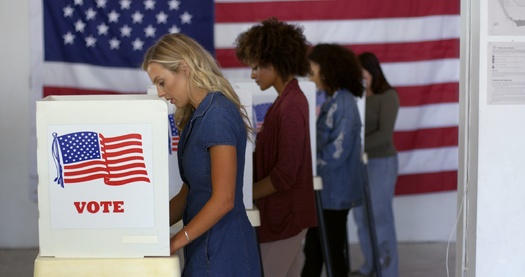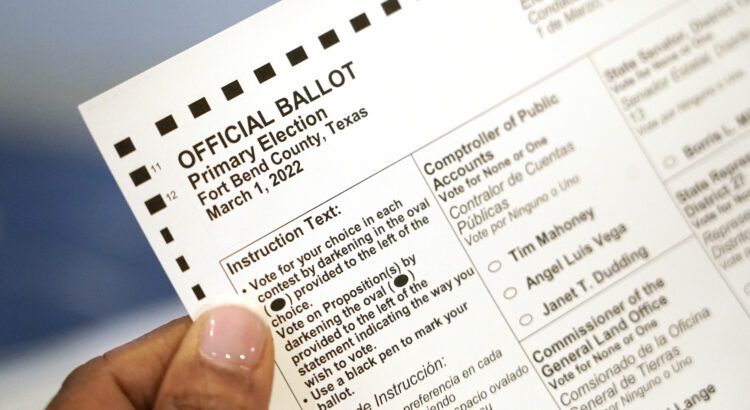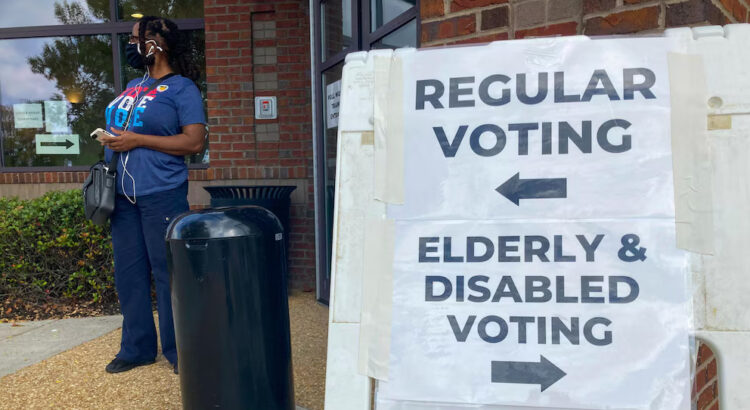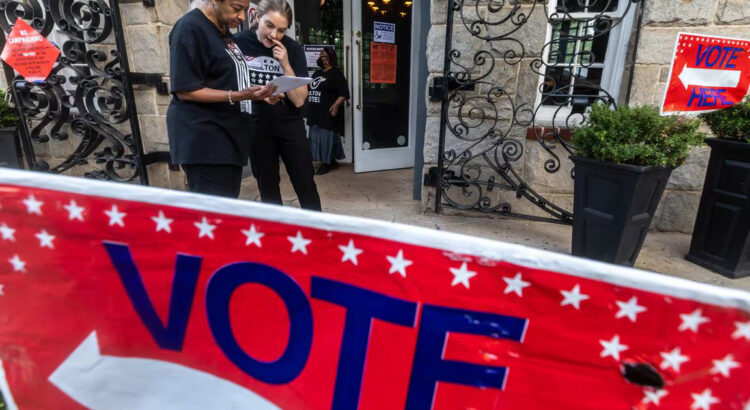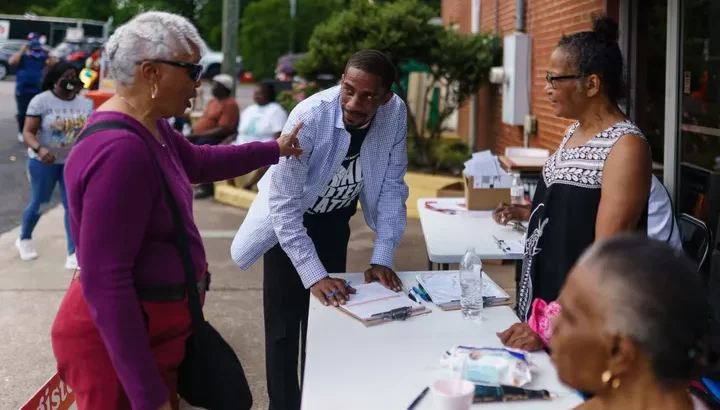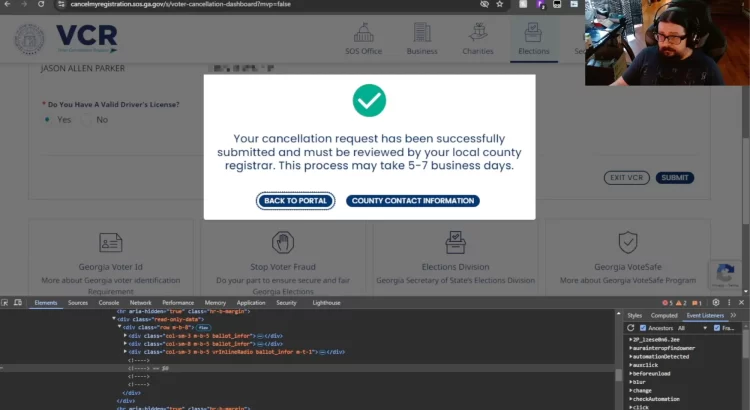Election officials and voting rights experts are worried about the impact on 2024.
By Matt Shuham
Aug 8, 2024, 02:21 PM EDT
In his 34 years working in elections, Wesley Wilcox had never experienced what happened to him just a couple of weeks ago. A woman who said she was involved with the conspiracy theory group True the Vote came to his office with a list of names about 2,500 entries long, spanning about 800 printed pages.
She was challenging thousands of her neighbors’ eligibility to vote, and was urging Wilcox, the supervisor of elections in Marion County, Florida, to investigate them, and potentially, remove them from voter rolls altogether.
“This is by far the largest set of ‘challenges’ that have ever been delivered to this office,” Wilcox told HuffPost. “Exponentially so.”
And Wilcox isn’t alone. Since Donald Trump lost the 2020 election and falsely blamed widespread voter fraud, right-wing activists have sought to “clean” the election system by deleting tens of thousands of their neighbors from voter rolls.
They’ve been aided in their work by groups like True the Vote and the Election Integrity Network, which have promoted software that makes it easy to challenge the eligibility of thousands of voters at a time, simply by comparing U.S. Post Office change-of-address data to voter rolls and other lists. Across the country, activists are taking these lists to their local election officials, urging them to purge voters.
As Wilcox looked through a sample of the 2,500 names that were challenged in Marion County, he told HuffPost, he couldn’t find a single valid challenge. Instead, the challenges had been filed against a mix of legitimate, eligible voters; voters who simply shared common names like “David Martin” or “Rebecca Bennet”; and names that Wilcox had already removed from the voter rolls himself ages ago, either because the voter had died or moved out of the county. In short, he said, the underlying data was inaccurate and unreliable.
“I have yet to find one of them that I felt was credible enough for me to actually file documentation for that voter,” he said. “So as a good steward for voter registration, which is what I’m charged with doing, I should not act upon stuff that is proven to be not credible.”
This year, election officials like Wilcox have spent valuable time sorting through pages of these mass voter challenges. And voting rights advocates worry that the trend could result in eligible voters being removed from the rolls, or from accommodations like being on lists to automatically receive ballots in the mail.
Last month, the Texas secretary of state’s office sent a memo to election officials throughout the state reiterating Texas’ legal requirements for registration challenges, and state officials in Michigan, North Carolina and Nevada have sent out similar memos, according to documents reviewed by HuffPost.
But experts and election officials who spoke to HuffPost said voters should confirm their registration status now — before the November election season heats up — just to be safe.
“Voter challenges have been sold to citizens as a means of civic engagement — and I think what gets lost in the picture is that there are real voters on the other side of the screen,” Alice Clapman, senior counsel in the Brennan Center for Justice’s voting rights program, told HuffPost. “This activity, which seems to some people like a constructive way to help election officials, is actually making their jobs harder, and risking disenfranchising their neighbors and people in their community.”
The Era Of Mass Voter Challenges
Laws allowing challenges to voter registrations have existed, and been abused, for years. But the trend of mass challenges accelerated after Trump’s 2020 loss.
The month following that election, True the Vote teamed up with Georgia Republicans to challenge the eligibility of more than 364,000 voters in the state, based in part on U.S. Postal Service address-change data.
The mess that followed showed the flaws in the mass voter challenge process. The Atlanta-Journal Constitution reported that challenged voters included a man whose son had the same name as him and had moved to New York, and other people who had moved out of state to take care of family members before moving back to Georgia.
Some voters only found out their registrations had been challenged when they didn’t receive requested ballots in the mail for Georgia’s January 2021 U.S. Senate run-off election. Ultimately — after courts stepped in — the vast majority of these challenges were rejected. True the Vote’s list “utterly lacked reliability” and “verge[d] on recklessness,” a federal judge later observed.
But True the Vote wasn’t done. The group, which was featured in the endlessly debunked conspiracy theory film “2000 Mules,” has spent years working to create the false perception that U.S. elections are plagued by widespread fraud. Four years before the 2020 election that he tried to steal, Trump cited True the Vote’s Gregg Phillips to assert that millions of ineligible voters cast ballots in the 2016 election. The claim, of course, was nonsense.
Now, True the Vote has turned its voter challenge technique into an app, called “IV3,” to allow activists across the country to create mass voter registration challenge lists based on Postal Service address-change data, local voter rolls and other information. The data is often well out-of-date, and there are lots of reasons people might legitimately change their address without changing their voter registration — such as students who temporarily relocate to college campuses or servicemembers located overseas.
Other seemingly suspicious records are easily explained. In one instance reported by CNN, True the Vote’s Catherine Engelbrecht told a webinar about a “sketchy” address in Phoenix that hundreds of people had purportedly listed on their voter registration, saying she would “probably” challenge the registrations. The address, it turns out, was legitimate — a local nonprofit offers it as a mailing address for homeless people.
Other challenges targeted assisted living facilities and nursing homes, CNN reported. Engelbrecht has claimed that hundreds of thousands of challenges have been filed with IV3.
In Travis County, Texas — home to around 900,000 registered voters — election officials have seen an unprecedented number of challenges, somewhere between 10,000 and 20,000 this year alone, Chris Davis, the county’s voter registration director, told HuffPost. More than half of those challenges came from one woman, he said, though the majority of challenges rely on U.S. Postal Service change-of-address data, with many challengers saying they were volunteering with True the Vote.
“What we’ve seen is a lot of folks just taking that list and not doing a whole lot of work or research, [then] turning around and submitting it to us, and saying, ‘I hereby challenge the voter registration of all these individuals on the grounds of residence,’” Davis said.
The vast majority of challenges were irrelevant, he said, as they applied to people county officials had already put on the “inactive” voter list. What’s more, the challenges largely didn’t meet the requirement in Texas law for “personal knowledge” of the relevant challenge to the voter’s eligibility, Davis said, nor are most of the challenges sworn statements, which need to be made before an authorized person such as a notary.
Across the country, election officials are receiving similar challenges that don’t meet legal criteria. But many are still investigating them.
‘The Left Will Hate This’
True the Vote is not alone. Multiple right-wing groups have developed their own technology to empower volunteers to file mass voter challenges, all of which depend in some form or another on publicly available data like Postal Service change-of-address information and voter rolls — meaning they’re extremely susceptible to producing out-of-date or even harmful challenges.
One program, EagleAI — pronounced “Eagle Eye” — has been promoted by Cleta Mitchell, the conservative attorney who infamously participated in the 2020 telephone call in which Trump demanded Georgia’s secretary of state “find” the votes necessary for Trump to win the state.
Mitchell leads the Election Integrity Network — which itself is part of the Conservative Partnership Institute, a home base for former Trump administration officials and allies — and in that capacity, she has built a network of volunteers across the country.
“The left will hate this — hate this. But we love it,” Mitchell said of EagleAI during one presentation reported on by The Associated Press and NBC News. The elite Christian conservative fundraising group Ziklag announced plans to invest $800,000 in EagleAI, according to ProPublica and Documented, an investigative watchdog that has worked to keep track of registration purges.
At least one Georgia county has signed a contract to use the software, and in May, the director of the Florida Division of Elections sent county officials a list of 10,000 names to review that a local “concerned citizen” had generated with EagleAI.
Nonetheless, even grassroots right-wing activists appear to be growing frustrated with both EagleAI and IV3, calling data produced by the programs “completely nonfunctional” and “significantly inaccurate,” NBC News reported last month.
Other efforts are state-based, including the “Pigpen Project” in Nevada and “Soles to the Rolls” in Michigan. Some even go so far as to go door to door to ask voters to confirm their information, raising concerns about intimidation. The Republican Party is also involved in the effort — in June, a federal judge rejected a GOP lawsuit alleging Nevada officials had failed to properly maintain voter rolls. (The GOP’s data was “highly flawed,” the state said.) A similar suit, against the state of Michigan, is ongoing.
And some states have made mass challenges even easier. In Georgia, S.B. 202, passed in 2021, allowed anyone to formally challenge an unlimited number of registrations, and S.B. 189, passed this year, requires voters to defend their registration against even frivolous challenges, sometimes at in-person hearings. It faces a lawsuit.
One irony of the mass challenge trend is that there is already a widely credible, bipartisan tool for making sure states’ voter lists are up to date — and red states have left it en masse since last year.
ERIC, or the Electronic Registration Information Center, works to keep member states’ voter lists up to date by creating a central clearinghouse where members can share information — including change-of-address data, but also more sensitive information like driver’s license records.
ERIC’s membership peaked in 2022 when 34 states were part of the compact. But ERIC is yet another victim of the Republican Party’s relentless conspiracy theorizing about elections.
That’s because, in addition to helping maintain voter rolls, ERIC also requires member states to take steps to register eligible voters. That part of the compact wasn’t controversial until 2022 when the conspiracy theory website Gateway Pundit falsely said the right’s favorite bogeyman, George Soros, had “founded and funded” ERIC and that the multistate agreement was a “left wing voter registration drive.”
The lie spread, and nine Republican-led states ultimately left ERIC. As HuffPost reported last September, they haven’t been able to replace the service.
That void, in turn, “has allowed an unauthorized private group to swoop in and conduct a function that belongs to the state,” voting rights groups in Ohio, one state that left ERIC last year, said in a letter to Secretary of State Frank LaRose (R) last month, referring to the Ohio Election Integrity Network, a local group that has challenged registrations.
The Risks of Purging Voters – And What You Can Do
Even if many challenges are rejected by election administrators, many are not. And given that America’s elections — including its voter rolls — are largely administered on the local level, there’s always a chance that purges go unnoticed.
In Waterford Township, Michigan, for example, the local clerk removed 1,000 people from voter rolls — including an active-duty Air Force officer, who was incorrectly purged — after activists challenged the registrations based on Postal Service change-of-address data. The clerk sent certified mailers to the list and removed any voters from the rolls who did not respond. The purge only became news months later when The New York Times reported it.
The challenges also add more work to election administrators’ full schedules — when their responsibilities already include voter registration list maintenance.
“We’ve got all we can say grace over just doing what we’re required to do, so someone dropping 2,500 [names] on us is a recipe for, ‘Hey, we’re just not going to have the capacity to get it done,’” Wilcox said, noting that the lengthy list of names reminded him of another trend — inundating election offices with public records requests.
There are federal protections in place for voters’ benefit. According to the National Voter Registration Act, a voter can only be removed from voter rolls due to a change in residence if they request the removal or confirm their change of address — or, if neither condition is met, the voter fails to respond to a mailed notice and fails to vote during the next two federal general election cycles after receiving the notice.
On top of that requirement, the NVRA prohibits election offices from “systematically” removing ineligible voters from registration lists within 90 days of a federal election, which was Wednesday, Aug. 7, this year.
But voters should remain vigilant. Georgia’s new law, for example, allows voters to be removed from the rolls up to 45 days before an election. And Davis, from Travis County, Texas, said there’s an additional concern that voters “inadvertently removed from the rolls” may not realize that until much closer to Election Day.
Clapman, from the Brennan Center, said that even voters who remain registered could find themselves on “inactive” lists, meaning — depending on local and state rules — they might not receive a mail-in ballot even though they’d previously been on a list to receive one automatically. If all else fails, she said, voters who find themselves kicked off voter rolls should insist on a provisional ballot.
But there’s still time to avoid that hassle. The election officials HuffPost spoke to stressed that, as November draws nearer, their offices will become bee hives of activity. It’s better to confirm your registration status sooner than later, they said. Check your state or county’s online voter registration portal, if there is one, or simply call your local election office to ask about your registration status.
Or, if you really can’t figure out your status, feel free to submit your registration application again. Election offices have processes in place for updating old registrations if they receive a duplicate, and sometimes it’s helpful simply to update your address on file or the signature you use to verify your ballot. But be wary. Some states’ registration deadlines occur days or even weeks before Election Day.
“Do yourself a favor, do the elections office a favor — and don’t wait,” Wilcox said.
Source
